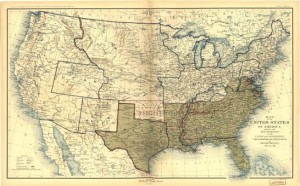 Amos C. Dayton is a prolific writer and leading proponent of Landmarkism, a growing movement that is hyper-local Baptist church centric and does not recognize the validity of other Christian groups. His influence in Tennessee is powerful. Since 1854, Dayton has lived in Tennessee, where for several years he served as the corresponding secretary of the Bible Board of the Southern Baptist Convention and was a member of the First Baptist Church. Growing friction between the church’s pastor and Dayton (as well as J. R. Graves, another leading Landmarker), eventually led to Dayton and Graves being expelled from the congregation. In addition, Dayton was forced to leave the Bible Board.
Amos C. Dayton is a prolific writer and leading proponent of Landmarkism, a growing movement that is hyper-local Baptist church centric and does not recognize the validity of other Christian groups. His influence in Tennessee is powerful. Since 1854, Dayton has lived in Tennessee, where for several years he served as the corresponding secretary of the Bible Board of the Southern Baptist Convention and was a member of the First Baptist Church. Growing friction between the church’s pastor and Dayton (as well as J. R. Graves, another leading Landmarker), eventually led to Dayton and Graves being expelled from the congregation. In addition, Dayton was forced to leave the Bible Board.
Remaining in Nashville, Dayton expanded his influence through prolific writing. In addition to authoring books, he served as associate editor of the Tennessee Baptist (1858-1859). During this time, his popularity spread throughout much of the South. In particular, his travels into Georgia and Alabama resulted in a large following in those states.
This month, against the backdrop of the growing Union presence in Nashville and Tennessee at large, Dayton and his family–his wife and eight children–move to Georgia to accept the pastorate of the Lafayette Baptist Church. Ever the entrepreneur, he soon establishes “Dayton’s Select School for Girls,” serving as president and a professor. The school lasts less than a year. Also while in Lafayette, Dayton assumes the editorship of the Baptist Banner newspaper. Originally named the Landmark Banner and Cherokee Baptist in 1859, the independent publication is identified with the Cherokee Georgia Baptist Convention. The paper is known for espousing Landmarkist views and being a competitor to (and critic of) Georgia Baptists’ Christian Index.
In the summer of 1863, Dayton and his family move yet further south, to Perry, Georgia, to assume the presidency of the Houston Female College. He also continues as editor of the Banner.
A. C. Dayton’s response to war pressures offers a glimpse into how some Baptist ministers of the South successfully continue in their vocations in the midst of the great conflict. His story also reflects the fact that many Baptist leaders remain publicly concerned about proper doctrine even as the Confederacy is slowly crumbling. Within Baptist life of the South, cultural, racial and doctrinal purity are all concerns that occupy the thought and work, in varying degrees and configurations, of many ministers during the war years.
Source: Jarret Burch, “A Tennessee Baptist Returns to Georgia: The Latter Life of A. C. Dayton,” Tennessee Baptist History, Fall 2005, pp. (link)


